LTUE 2016 – What I Learned
Posted by Rampant Coyote on February 15, 2016
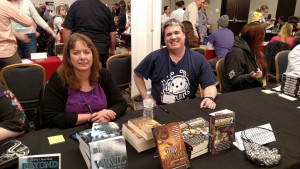 I came home with dozens of pages of notes from Life, the Universe, and Everything. I think I gathered an average of 2 pages of notes from each of the panels, and hit an average of five panels a day, dealing with such topics as: Managing a giant project, marketing on a budget, how to write a novel in three days, roleplaying for writers, hooking your readers, writing military for science fiction, publishing pet peeves, and increasing your writing productivity. I spent most of my time in writing and professional development panels. It would be cool to have more video game development panels next year. Maybe I should sign up.
I came home with dozens of pages of notes from Life, the Universe, and Everything. I think I gathered an average of 2 pages of notes from each of the panels, and hit an average of five panels a day, dealing with such topics as: Managing a giant project, marketing on a budget, how to write a novel in three days, roleplaying for writers, hooking your readers, writing military for science fiction, publishing pet peeves, and increasing your writing productivity. I spent most of my time in writing and professional development panels. It would be cool to have more video game development panels next year. Maybe I should sign up.
But since I’m much more of a n00b with writing than I am with game development, I went where I needed the most work. Much of the information was applicable for anyone working on any creative projects, however. But here are a few tidbits that I thought I’d share:
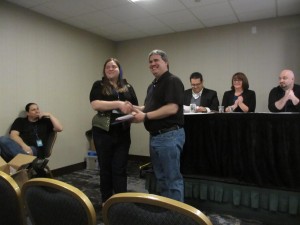 * Backlist is everything. Or, as it was put in one session, “The best way to market your current book is your next book.”
* Backlist is everything. Or, as it was put in one session, “The best way to market your current book is your next book.”
* In today’s market, six months is about as long as people have patience for between (book) releases. I’d guess that in the gaming world, for mobile gaming that’s probably about the same. Maybe a year for PC games.
* Process is an individual thing – what works for one person may totally NOT work for someone else. HOWEVER — that shouldn’t be an immediate excuse. Our processes can always be improved, and what we may think is “working well” for us might not actually be.
* The brain works surprisingly well on the subconscious or semi-conscious level to meet tasks required of it if you train it to do so. But it’s easy to sabotage this by making excuses and allowing it to provide an “out” or distractions.
* Some of publishers’ universal pet peeves: Failure to read & follow submission guidelines (probably #1 across the board), entitled / demanding / unteachable prima donna authors, noticeably bad spelling and grammar (a few mistakes are one thing, but several in the first page usually means instant rejection), and a failure to understand the proper use of the apostrophe and comma.
* CREATE CREATE CREATE. Lots. It’s the best way to get better. Practice. Now, taking the time to refine and improve and perfect is important, too, but there’s a point where you hit the law of diminishing returns and its time to release or shelve it, and move on to something else as quickly as possible.
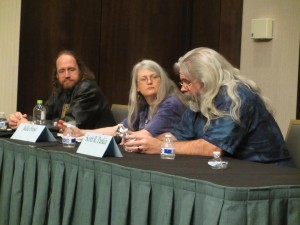 * Nanowrimo is nothin’. It *IS* possible to write a novel (short novel, maybe) in three days. It’s like a Game Jam. It’s only a first draft, and it takes immense discipline and seclusion for a solid three days, requires some pretty solid structure (or even a formula) going in, and you are going to be a wreck by the end of the third day, but it’s doable. Just ask Michael Moorcock. Or L. L. Muir, who gave the presentation.
* Nanowrimo is nothin’. It *IS* possible to write a novel (short novel, maybe) in three days. It’s like a Game Jam. It’s only a first draft, and it takes immense discipline and seclusion for a solid three days, requires some pretty solid structure (or even a formula) going in, and you are going to be a wreck by the end of the third day, but it’s doable. Just ask Michael Moorcock. Or L. L. Muir, who gave the presentation.
* In-between releases, a developer / author / creator should take some time to give back to the community. They should be part of the community, a contributor, not just someone who shows up every few months to say “buy my thing!”
* Focus on your creation / product. Not yourself. It’s not about you, the creator. It’s what you are creating for your audience. Don’t lose sight of that.
* We are entertainers. Our audience doesn’t work for us – it’s the other way around. Focus on making people happy.
* What we do is both an art and a business. We do it for the art, and we create what we create because we have passion for it – and we must. But those who survive and “make it” are almost always the ones who treat it as a business and a career. And, of course, *produce*.
* In writing, don’t worry about nailing the perfect opening sentence or opening chapter. That happens in revision. As often as not, that whole first chapter will just go into the virtual wastebasket anyway when you realize you started too early.
* Your editor is your partner, not your adversary. And most of the time, their suggestions aren’t demands … they are possible solutions to a problem they’ve found. They may be wrong. If that’s the “hill you are ready to die on,” stick to your guns, but pick your battles. But more often than not, rather than digging in you really just need to talk with them and figure out an alternative solution to the problem they are seeing.
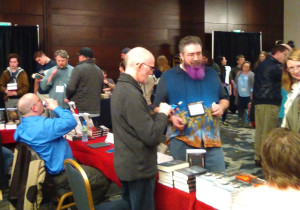 * Genre fiction (and I’d say about all video games) are concept-driven. You should be able to explain your concept in as little as 10 seconds, and maybe a more elaborate version within 60 seconds. If you can’t do that, you’ve got a fundamental problem. But ideally, your concept alone in the 1-3 sentence “elevator pitch” should rock it and capture the listener’s interest all by itself.
* Genre fiction (and I’d say about all video games) are concept-driven. You should be able to explain your concept in as little as 10 seconds, and maybe a more elaborate version within 60 seconds. If you can’t do that, you’ve got a fundamental problem. But ideally, your concept alone in the 1-3 sentence “elevator pitch” should rock it and capture the listener’s interest all by itself.
* READ in your chosen genre. I’d add… PLAY GAMES in your chosen genre. LOTS. Especially the good ones. This helps train your brain to the expectations of the genre.
* Marketing rule-of-thumb: Spend approximately 10% of what you expect to make on marketing. But be honest on those projections.
* Plan your schedule out months in advance. Be professional (and realistic). Include marketing / business activities.
* In the past, warfare and weaponry “force multipliers” were all about increasing damage. In the post-nuclear age, it’s more about accuracy and intelligence: Hitting exactly the right target.
* In the past and future, with humans or human-like beings fighting, warfare will always be about logistics (and fortification).
* Your odds of “making it” as an author (or, I’d suggest, as an indie game developer) are SLIM. But there are things you can do to boost your odds… maybe not putting them in your favor, but increasing your chances to less slim. Combine that with persistence, and you see where the successes are coming from.
* Get help. Ultimately – we can’t do it all. And if we try, we’re taking time away from the things we do well to work on things that we probably don’t. Or maybe really suck at. What’s a better use of our time? And frankly we often simply need another set of eyes or suggestions.
* Shut up and write. Or create.
The thing I saw over and over again was the value of persistence, focus, and constant improvement / refinement of yourself as a creator. In a nutshell, short of blind luck (which does happen), that’s the only way to “make it,” and even that depends on luck… being ready when opportunity comes knocking.
In a similar vein, NETWORKING. It’s easy to believe that since so much of what we do is fairly solitary, that our need for a community is minimal. But if you talk to the pros, the guys and gals who have “made it” to a reasonable level of success, they will talk a lot about it. The whole thing about opportunity knocking? It finds your door through your network. And doubly cool, events like this provide tons of networking opportunities. But of course, calling it “networking” is a formal and businesslike description of what really comes down to meeting or getting to better know a lot of cool people doing cool things and building friendships. That’s intrinsically valuable all by itself, but the business benefits of this are MANY.
As to the whole persistence and productivity thing… 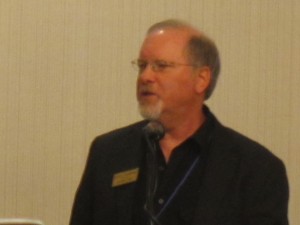 Kevin J. Anderson offered a really great analogy (with respect to writing, but again… I think it was applicable to any creative endeavor). He said there are a couple of ways to make popcorn (well, not including just nuking a bag). First of all, you can take a clean pan, put it on the oven burner, add exactly 1 tablespoon of oil and evenly spread the oil across the entire surface of the pan. You then turn the burner up to get the pan to exactly the right temperature – no more, no less. Then you select the perfect kernel of popcorn from your container of popcorn, and place it in the exact center of the pan where the heat is perfect. Then wait as the ripples form, and then (hopefully) when the kernel pops you immediately remove it to a paper towel to soak up the excess oil. Then you turn off the burner, let the pan cool, and then wash it and clean it so the pan is in pristine condition. Then you repeat the entire process all over again.
Kevin J. Anderson offered a really great analogy (with respect to writing, but again… I think it was applicable to any creative endeavor). He said there are a couple of ways to make popcorn (well, not including just nuking a bag). First of all, you can take a clean pan, put it on the oven burner, add exactly 1 tablespoon of oil and evenly spread the oil across the entire surface of the pan. You then turn the burner up to get the pan to exactly the right temperature – no more, no less. Then you select the perfect kernel of popcorn from your container of popcorn, and place it in the exact center of the pan where the heat is perfect. Then wait as the ripples form, and then (hopefully) when the kernel pops you immediately remove it to a paper towel to soak up the excess oil. Then you turn off the burner, let the pan cool, and then wash it and clean it so the pan is in pristine condition. Then you repeat the entire process all over again.
Or, of course, you can just dump all the popcorn in, not really be able to predict in advance which kernel will pop or which direction it will pop. In the end, you’ll have a whole bowl full of popcorn either way, but in the first case you may starve to death before you get there.
Obviously, he advocates more of a shotgun approach, taking advantage of unpredictable opportunities as they arise.
One more thing about LTUE, which I already knew but was powerfully reinforced this year: The science fiction / fantasy writing community in Utah is incredibly supportive and awesome. I saw it and I experienced it firsthand every day of the symposium. Industry veterans at all levels were willing and even eager to stand and talk with others in their field of any level, offering advice and encouragement. We were cheering on each other’s successes and being really cool when a dummy like me stuck his foot in his mouth. All this in an industry sort of notorious for its introversion. I saw it with the art folks, too, as my daughter had a similar experience with that group. Scott Parkin told me Saturday night that over 12% of the Writers of the Future winners come from Utah, and he believes it is in no small part due to the community and mentorship available here.
Me? I’m definitely signing up for next year. I learned a lot, met a lot of great people, and had an absolute blast.
(Note – some of these photos are courtesy of my good friend, and fellow game-developer-and-author John M. Olsen and his wife.)
Filed Under: Biz, Books, Events - Comments: Read the First Comment

Marscaleb said,
“* The brain works surprisingly well on the subconscious or semi-conscious level to meet tasks required of it if you train it to do so. But it’s easy to sabotage this by making excuses and allowing it to provide an “out” or distractions.”
OMG this is EXACTLY what I need!